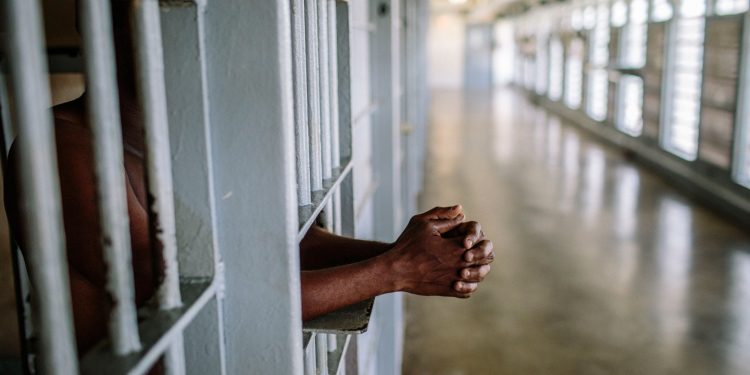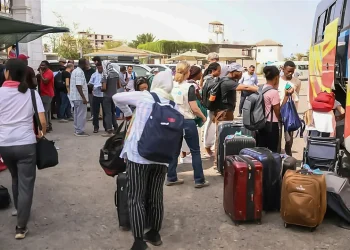By Emmanuel Nduka and Chioma Iruke
A Nigerian deportee who was recently kicked out of the United Arab Emirates, UAE, over Visa expiration, has told the Heritage Times that over 6,000 Nigerians are currently languishing in detention facilities across the seven states of the UAE.
The deportee, Festus Chukwuweike, an indigene of Ndokwa-West Local Government Area of Delta State, said he was arrested by the UAE authorities in early February, and jailed for 52 days, upon the expiration of his two-year working visa.
The 33-year-old who lamented that his ordeal was caused by the Nigerian Government’s indifference in resolving the travel and visa issues between both countries, narrated that he relocated to the Sharjah in the UAE, in 2018 with a two years working visa.
“I saw over 6000 Nigerians in different jails. Some have spent up to six months there. I was made to run covid-19 test seven times. Our visas had expired and the authorities refused to renew it. So we were hiding and doing daily jobs just to make ends meet. If you get caught, you spend at least three months in detention before you are deported back to Nigeria. I was just lucky to spend 52 days.
“After I was arrested in Sharjah, I was moved to about four different prison cells before I was deported. Each prison cell was less comfortable than the other; with the guards giving empty promises of returning me home while taking me in the tinted armoured car.
“Many Nigerians are languishing in UAE prisons. I realised that there are people there that have spent more than two years in custody…. you don’t need to do anything for you to be stopped and searched, just look like a Nigerian,” he lamented.
Sadly enough, Sharjah is home to at least 109 Nigerian companies across different sectors. The rift between Nigeria and the UAE can be traced back to 2016, after complaints of Nigerians being unfairly treated had gone viral. According to reports, Nigerians were only given a week or two weeks visa, no matter their stated purpose for visiting. Nigerian students were further prevented from having bank accounts in the country.
Fast-forward to the COVID-19 pandemic of 2020, the UAE on March 12, issued a suspension of visa renewal to Nigerians who resided in their country. Suspension of permanent residency and tourist visa were also included. The Arab nation further stated that all previously issued visas were invalid, and that all visas for those living in Dubai at the time, would expire in a week.
While the sudden announcement drew speculations from many corners, the UAE dispelled the insinuations and insisted that their action was based on COVID-19 protocols. The outrage by many Nigerians was also linked to the fact that Nigeria gave Dubai (a city within UAE) its highest revenue in tourism in 2019. Reasons as to why Nigerians were specifically asked to evacuate varied, but Heritage Times gathered from the Nigerians in Diaspora Organization in UAE, that the UAE government, in collaboration with the Federal Authority for Identity and Citizenship, National Emergency Crisis and Disaster Management Authority, as well as the Ministry of Human Resources and Emiratisation, sent memos to every country to evacuate her citizens with threats to revoke labour ties.
On further inquiry, Heritage Times learnt that Nigerian citizens were asked to pay between 2530 to 2550Dirhams for flight tickets, leading some Nigerians to cluster at the Nigerian Consulate in Satwa, Dubai. As a result, the Federal Authority for Identity and Citizenship in conjunction with Hind Humanitarian initiative, offered help to evacuate Nigerians. Nigerians were the only citizens offered such assistance.
In deliberate efforts to minimize its shame, by May 6, 2020, the Nigerian government evacuated 265 Nigerians from the UAE. Unfortunately, with the numerous help rendered, many Nigerians still opted to remain in the country illegally, resulting in their arrests, detention and convictions.
Festus further explained that he was picked up after they realised he was a Nigerian and his papers had expired. To facilitate his movement after spending 52 days locked up, he said: “I had to reject their food. If there’s anything this people hate, it is rejection of their food. We were over a thousand locked up and I’m speaking generally from all the four prison I was taken to. These people are all Nigerians. The thing is when they bring food, we refuse to eat as per we are going on hunger strike. You know human life is taken seriously there, no one is actually allowed to die while in their custody.
“So when I came I joined them initially. Then I began to see the faces of these guards, they get really angry when we reject the food and they just leave it there for us and walk out. Although we eat it at night so we don’t die of hunger, I realised that our initial refusal had more effect on them,” Festus said.
Responding to questions of discrimination, the returnee explained that the Nigerian reputation had suffered internationally, as the knowledge of you being a Nigerian automatically makes you a target for security agencies. When asked why he had refused to go home despite the arrival of a free plane to Nigeria, Festus explained that he had nothing to look up to in Nigeria, as he had sold his family house to facilitate his journey which he made in 2018. He explained further that at the expiration of their visas, he couldn’t find any rewarding job, thus, he was left to find menial jobs in the evenings when security operatives had gone home.
The UAE, especially Dubai, is a top destination for Nigerian migrants. A percentage among Nigeria’s vibrant youthful population find the Middle East nation attractive. Nigerian elites also find the tourism hotspots in the gulf state appealing. Many Nigerian politicians have also been reported to own properties in the UAE. The UAE consists of seven independent city-states: Abu Dhabi, Dubai, Sharjah, Umm al-Qaiwain, Fujairah, Ajman and Ra’s al-Khaimah.
The Nigerians in Diaspora Organization in UAE further told The Heritage Times that it concurred with the deportee concerning the bad reputation Nigerians carry within the country. Although the NGO claimed that Nigerians ‘were not treated badly and different’. It bemoaned that many Nigerians who arrive the country and are aided with getting a work permit from their employers, are guilty of absconding work after two or three months. This comes as a loss to the employers, as they spend close to 5000 Dirhams. The organization explained further that often time, the employers taking the interest of their organization into consideration or being careful of previous experiences, have been tagged as racists by many who have refused to accept the facts before them.
“Another thing that our people do here is that, when some employers employ them, and spend all the money in processing work permit after some months of signing contract, they will ask for resignation or they will abscond. So in this case, they prefer hiring other nationalities which will stick to their contracts; because they can’t afford to lose money after few months of processing work permit,” the NGO said.
The organization further told Heritage times that the rise in crime amongst Nigerians has not helped the situation, as frequent clashes between “Black AXE and NORSEMAN” cult groups had been reported in recent times.
“On the 28th June, these group of men confronted Cameroonians for refusing to join any of their cult groups. They met these Cameroonians beat them up and used AXE and knives to cut them. UAE has a strict law and the issue of blood are issues of concern. They don’t joke with seeing blood. After this incident, a group of 6 Nigerians attacked a police man, burst his head open and left him helpless in Jebel Ali.
“In Sharjah so many reports of fighting and blood shed was also reported. Thus, in their security briefing, they launched random flat checks and start packing people at random. We know some of these people don’t have valid visas. I personally intervened to pull out those that were wrongfully arrested, but along the line of appeal, I got to know that some don’t have valid visas. Others who had Visa and nothing incriminating were found in their room or flat where freed,” it added.
Heritage Times was further made to understand that deportation in the UAE only happens after a prison sentence has been completed. The prison sentence which has various lengths according to the crimes, has a period of thirty day for visa related offenses. At that, deportation is not on free ticket bases.
“UAE has law and Nigeria Mission in UAE can’t do otherwise especially when it is attached with Criminal cases. In UAE, it is important to know that they do not deport on free ticket. The jail sentences was just 30days for those without visa. But those found with alcohols in their flat or room where sentenced 2 to 3 months,” the NGO added.
According to findings by The Heritage Times, many Nigerians are still locked up in various jails in the UAE. This is because despite the conclusion of their jail terms, many cannot afford a return ticket back to Nigeria. Further findings on why there are no other options for convicted Nigerians to get a return ticket revealed that it was quite difficult for individuals to raise funds to help, due to some of the laws by the UAE. Although there were churches and NGOs involved in helping with tickets, much more is needed. A flight ticket from UAE to Nigeria goes between 1720 to 1800 AED which is between N170,000 to N190,000 according to Emirates Airlines.




































